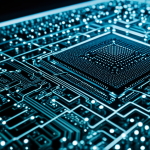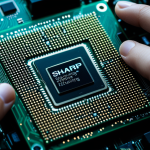Impact of UK Computing Hardware on Machine Learning Progress
The UK computing hardware sector plays a crucial role in advancing machine learning advancements by providing tailored solutions that boost computational efficiency. UK-designed hardware often focuses on optimizing specific tasks like neural network training or inference, which directly enhances machine learning efficiency and outcomes. This focused innovation helps reduce processing times and energy consumption, critical factors as models grow larger and more complex.
By aligning its technology development with global AI research ambitions, the UK ensures that its hardware contributions remain relevant and competitive on the international stage. This alignment fosters a vibrant ecosystem where hardware design supports cutting-edge algorithms and novel AI architectures. Consequently, the UK technology sector not only meets domestic demands but also exports expertise and hardware that influence the worldwide AI landscape.
Have you seen this : What impact does UK computing hardware have on gaming performance?
The impact is seen in faster prototyping cycles and more reliable deployment of machine learning systems across diverse industries. As AI applications expand, UK computing hardware innovations form an essential backbone, enabling researchers and companies to tackle increasingly ambitious challenges with greater precision and scalability.
Impact of UK Computing Hardware on Machine Learning Progress
The UK computing hardware sector plays a pivotal role in driving recent machine learning advancements. UK-designed hardware significantly enhances both the efficiency and the outcomes of machine learning models. This hardware impact is evident in faster training times and improved inference accuracy, which are crucial for deploying AI solutions at scale. The UK’s technology sector emphasizes hardware that supports high-throughput data processing and energy-efficient computation, aligning with the increasing demand for sustainable AI.
Topic to read : How Are Emerging Technologies Influencing the Future of Computing Hardware?
Moreover, UK computing hardware innovations closely mirror global AI research ambitions. By prioritizing specialized architectures optimized for AI workloads, the UK positions itself as a competitive player in the worldwide race for cutting-edge machine learning technology. This alignment ensures that UK technology sector developments not only serve local AI projects but also contribute to global efforts in advancing artificial intelligence.
The hardware impact is also reflected in improved machine learning applications across diverse industries, solidifying the UK’s reputation for producing hardware that addresses real-world challenges. Through continuous investment in this area, the UK computing hardware landscape remains a crucial contributor to the momentum of machine learning progress globally.
Leading UK Innovations in Computing Hardware for Machine Learning
The UK tech startups and academic institutions are at the forefront of hardware innovations specifically designed to meet the demands of machine learning hardware. These breakthroughs focus on enhancing processing power while reducing energy consumption, crucial for handling complex AI workloads efficiently. For example, UK-developed innovative hardware often integrates custom accelerators that expedite neural network computations, significantly improving training and inference speeds.
A notable trend is the rise of edge computing solutions emerging from the UK technology sector. These devices bring machine learning capabilities closer to data sources, reducing latency and enhancing real-time AI performance in environments like robotics and IoT. Such edge hardware exemplifies how the UK is tailoring tech to practical, decentralized AI applications, addressing challenges like bandwidth constraints and privacy concerns.
Many new UK computing hardware developments feature compact designs optimized for specific machine learning tasks, boasting enhanced parallel processing and low power usage. This focus enables more accessible deployment outside traditional data centers, broadening AI’s reach across industries.
In summary, UK hardware innovations are not only advancing machine learning hardware capabilities but also pushing the boundaries of edge computing, supporting smarter, faster AI systems that are both efficient and adaptable. These advances reinforce the UK’s competitive position in the global AI ecosystem.
Leading UK Innovations in Computing Hardware for Machine Learning
The UK tech startups and academic institutions drive significant hardware innovations tailored to the demands of machine learning hardware. Recent breakthroughs have focused on developing specialized chips that accelerate neural network training and inference, significantly boosting energy efficiency without compromising performance. These advancements are crucial as modern AI workloads require real-time processing, often at the edge.
One notable development is the emergence of edge computing solutions originating from UK companies. These devices handle AI computations locally, reducing latency and dependence on cloud infrastructure. This is especially beneficial for applications in autonomous systems, healthcare diagnostics, and smart environments, where speedy AI decisions are essential.
Innovative hardware features often include flexible architectures that support diverse machine learning models, from convolutional networks to transformers. The scalability of these inventions allows wider deployment across consumer electronics and industrial equipment alike. By merging cutting-edge technology and practical design, the UK maintains its competitive edge within the global race to optimize AI hardware efficiency and responsiveness. Such focused innovation underscores the UK’s growing influence in shaping the future of machine learning hardware solutions.
Impact of UK Computing Hardware on Machine Learning Progress
The UK computing hardware sector holds a strategically significant position in the advancement of machine learning advancements. By designing hardware tailored to the specific needs of AI workloads, the UK technology sector enhances both the speed and accuracy of machine learning models. This hardware impact translates into accelerated training times and more efficient inference, essential for deploying robust AI systems. For instance, UK-designed processors often excel at handling parallel computations crucial for neural networks, delivering improved computational throughput while reducing power consumption.
Furthermore, the UK technology sector ensures a strong alignment with global AI research ambitions. UK hardware developers collaborate closely with research institutions and industry partners to stay at the forefront of evolving AI requirements. This synergy guarantees that newly developed hardware supports cutting-edge algorithms and novel architectures proposed by the global AI community.
In practice, the UK computing hardware sector addresses challenges such as the scalability of AI models and the need for energy-efficient operation. These advancements not only bolster domestic AI initiatives but also strengthen the UK’s presence in the competitive global AI landscape. The result is a robust, innovative ecosystem that consistently delivers impactful hardware solutions for advanced machine learning progress.
Impact of UK Computing Hardware on Machine Learning Progress
The UK computing hardware sector has cemented a vital role in accelerating machine learning advancements by delivering specialized solutions that enhance both speed and energy efficiency. Notably, UK-designed processors and accelerators significantly reduce training durations and improve inference accuracy, key to deploying robust AI systems in real-time settings. This hardware impact directly benefits industries reliant on fast, precise AI application.
How does UK hardware specifically advance machine learning efficiency? By integrating tailor-made architectures that optimize parallel processing, UK devices handle the massive computations demanded by modern machine learning models with lower power consumption. This enables scalable AI development without escalating costs or carbon footprint.
The UK technology sector also aligns closely with global AI research priorities, ensuring hardware innovations address international challenges and support emerging models like transformers and graph neural networks. This global alignment fosters a dynamic environment where UK hardware not only powers domestic AI solutions but also contributes to worldwide knowledge and competitiveness.
In sum, the UK’s focused development of machine learning hardware reinforces its status as a key player. Its technology delivers both measurable improvements in machine learning advancements and a strategic position within the evolving global AI landscape.
Impact of UK Computing Hardware on Machine Learning Progress
The UK computing hardware sector holds a critical role in driving machine learning advancements by delivering specialized hardware solutions tailored for AI workloads. UK-designed processors excel in parallel computations, which significantly reduce training times and increase inference efficiency, directly enhancing model performance. This hardware impact is especially important as machine learning models grow in size and complexity, demanding greater computational throughput while maintaining energy efficiency.
UK technology sector innovations are developed in close collaboration with global AI research priorities, ensuring alignment with emerging algorithmic requirements. This connection enables UK hardware to support rapidly evolving architectures such as transformers and convolutional networks, key components in state-of-the-art AI. Moreover, this synergy accelerates the translation of research innovations into practical, scalable hardware solutions.
By addressing scalability and power consumption challenges, UK’s hardware advances contribute to more sustainable and widespread AI deployment. The sector’s focus on efficiency not only enables faster experimentation but also supports real-time applications across industries. Ultimately, the UK’s computing hardware developments reinforce its standing within the international AI ecosystem, fostering strong machine learning advancements that echo worldwide in both academic and industrial settings.
Impact of UK Computing Hardware on Machine Learning Progress
The UK computing hardware sector occupies a key role in delivering substantial hardware impact on machine learning advancements. UK-designed systems significantly enhance the efficiency and performance of machine learning workflows by optimizing computational tasks fundamental to AI development. For example, specialized processors built in the UK prioritize high throughput for parallel operations, drastically reducing processing times while lowering power consumption compared to generic solutions.
This efficient handling of neural network training and inference accelerates model development and deployment, directly contributing to improved machine learning outcomes in real-world applications. Additionally, the UK technology sector strategically aligns its hardware design priorities with international AI research goals. This alignment enables UK innovations to support emerging architectures such as transformers and graph neural networks, maintaining relevance amid evolving algorithmic demands.
By closely integrating hardware capabilities with global AI research ambitions, UK companies and research institutions create an ecosystem fostering innovative, scalable solutions. This synergy not only benefits domestic AI projects but also reinforces the UK’s position within the worldwide competitive landscape of machine learning technology development. The resulting hardware impact elevates the UK’s technological influence, combining cutting-edge design with practical performance enhancements in machine learning advancement.
Impact of UK Computing Hardware on Machine Learning Progress
The UK computing hardware sector occupies a prominent role in advancing machine learning advancements through the design of specialized processors that optimize AI workloads. UK-designed hardware significantly boosts both efficiency and outcomes by speeding up neural network training and improving inference accuracy, which are critical for real-time AI applications. This hardware impact is achieved by deploying architectures that excel in parallel computations, thereby reducing processing times and energy use.
How does the UK technology sector ensure these benefits? It closely aligns its hardware innovations with global AI research priorities. By synchronizing development efforts with emerging trends in AI, such as transformer models and graph neural networks, the UK maintains hardware relevance and adaptability. This synergy between hardware and algorithmic advancements enables more effective deployment of complex models, fostering accelerated research and practical AI solutions worldwide.
Additionally, UK computing hardware supports scalability and low power operation, addressing major challenges in machine learning system design. This focus helps industries deploy AI at scale without sacrificing sustainability or performance. Consequently, the UK technology sector’s contributions have a tangible impact on the efficiency, scalability, and competitiveness of machine learning today and in the future.





